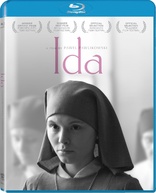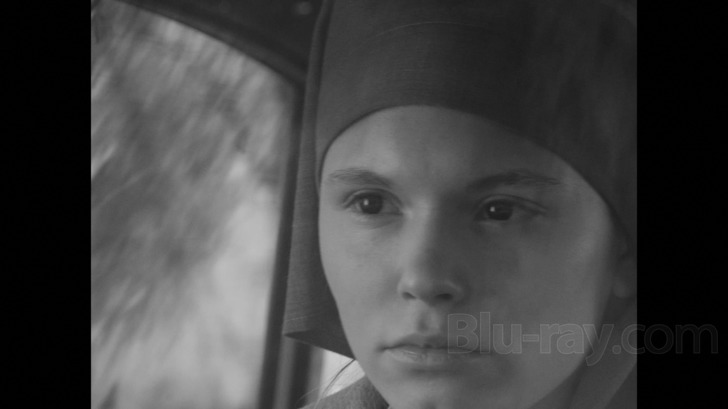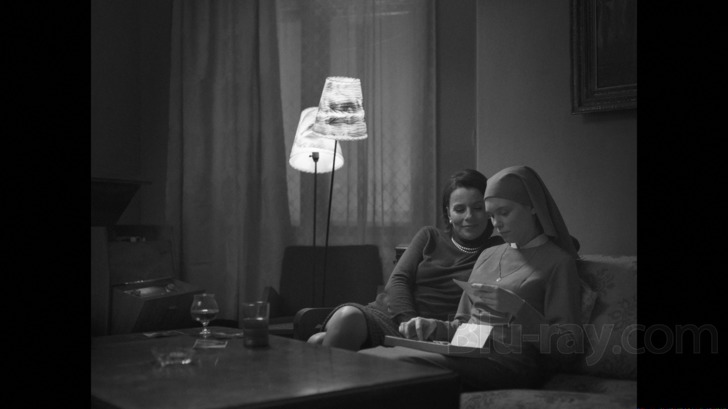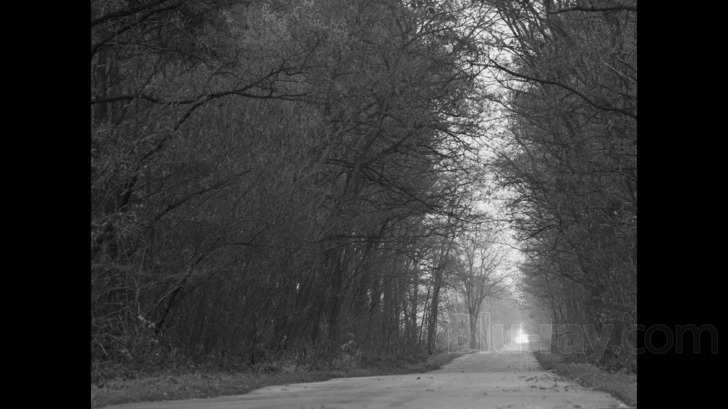Ida Blu-ray Movie
HomeIda Blu-ray Movie 
Music Box Films | 2013 | 80 min | Rated PG-13 | Sep 23, 2014
Movie rating
7.6 | / 10 |
Blu-ray rating
| Users | 0.0 | |
| Reviewer | 4.0 | |
| Overall | 4.0 |
Overview
Ida (2013)
In Poland in 1962, Anna is a novice, an orphan raised by nuns in the convent. She has to see Wanda, her only living relative, before her vows. Anna is told she is Jewish by Wanda. Both women start a journey not only to uncover their tragic family story, but who they are and where they belong. They question their religions and the ideas they previously believed in.
Starring: Agata Kulesza, Agata Trzebuchowska, Joanna KuligDirector: Pawel Pawlikowski
| Drama | 100% |
| Foreign | 84% |
| Period | 10% |
| Coming of age | 6% |
Specifications
Video
Video codec: MPEG-4 AVC
Video resolution: 1080p
Aspect ratio: 1.33:1
Original aspect ratio: 1.37:1
Audio
Polish: DTS-HD Master Audio 5.1
Polish: DTS-HD Master Audio 2.0
Subtitles
English, French
Discs
25GB Blu-ray Disc
Single disc (1 BD)
Playback
Region A (locked)
Review
Rating summary
| Movie | 4.0 | |
| Video | 4.5 | |
| Audio | 4.0 | |
| Extras | 2.0 | |
| Overall | 4.0 |
Ida Blu-ray Movie Review
The past is always present.
Reviewed by Jeffrey Kauffman September 27, 2014Classical music fans know to expect a different experience if they go to a concert featuring a symphonic score or one featuring a chamber piece. Chamber music sacrifices a bit of the grandiosity of orchestral music, offering clarity of line, more nuanced interplay and (generally speaking) smaller scale (no pun intended) statements instead. Ida, a fascinating 2013 Polish film which premiered stateside this year and will be Poland’s entry for the Best Foreign Language Film Academy Award next year, might therefore be best appreciated as the cinematic equivalent of a chamber piece. It’s small and intimate even if it deals with the weighty issues of identity, religious affiliation and, ultimately, faith itself. Focusing almost entirely on only two characters, Ida works from the outside in, quickly (almost comically) detailing the plight of young novitiate Ida (Agata Trzebuchowska), an orphan who was raised in the convent where she’s now due to take her vows. Ida’s Mother Superior wants Ida to step outside of the convent walls for at least a moment or two, especially since the young woman has one living relative still close enough to contact. Ida is hesitant, but gives in to her mentor’s orders, and shortly thereafter arrives at the apartment of her Aunt Wanda (Agata Kulesza). Within mere moments, Wanda casually informs Ida that she was born Jewish and that her parents were killed in the Holocaust. That provides just enough compelling information to set Ida on its course of revelation, recriminations and repercussions. Co-writer and director Pawel Pawlikowski doles out information very slowly in the film, and it takes a while to discover why Wanda is so bitter and troubled. Pawlikowski perhaps underplays his hand just a bit with regard to Ida, who seems to drift through the film like a slightly dazed waif, an early 1960s would be nun version of Being There’s Chauncey Gardiner, a character who observes but never really interacts. While some of Pawlikowski’s theses are problematic (more about that later), Ida is an engrossing film that will almost certainly appeal to the Art House crowd.

When Ida arrives at Wanda’s flat, the older woman comes to her door in a housecoat, and it’s soon shown that there’s a man getting out of bed and dressed in her bedroom. Wanda lets Ida know she knows who Ida is, but that’s about the extent of any familial affection she shows. Instead, she asks Ida what the nuns at the convent have told the young woman about her Aunt, to which Ida responds, “Nothing.” Wanda is surprised, asking again if no one ever told Ida what she does. There’s a fleeting implication due to the context that perhaps Wanda is a prostitute, but it turns out the scornful middle aged woman was actually a prosecutor in Poland’s Communist regime. While things are never made overly clear (a lot of Ida is rather discursive), it appears that perhaps Wanda’s star has fallen and she’s out of favor with the ruling elite. Nonetheless, she still has some of the accoutrements of power, including a slightly threatening mien which comes into play later in the film.
The two exchange slightly stilted pleasantries (if looking at photos of now dead relatives can be termed “pleasant”), and then it simply seems that both are going to go their separate ways. Ida heads off to the train station while Wanda smokes furiously and seems to be silently battling some inner demon. Again for reasons which are perhaps only implied, Wanda reunites with Ida at the train station, and the two decide then and there to track down the man Wanda feels is responsible for the deaths of Ida’s parents, and to hopefully also discover where the corpses were buried. It’s an admittedly odd setup for a supposed “road movie”, but Pawlikowski, while still playing his cards rather close to his vest, languidly offers tidbits that start to indicate what’s really going on with Wanda.
It’s perhaps misleading to refer to something as traumatic as the events alluded to in Ida as a mere “MacGuffin”, but it’s obvious from fairly early on that Pawlikowski is less interested in catharsis than process. Interestingly, the film tends to veer off to Wanda unexpectedly at several key junctures, none more revelatory than late in the film, after several key plot points have been addressed and it seems that Ida is more or less well adjusted to returning to the convent and pursuing a life of isolation and devotion. But there’s a slightly troublesome subtext here that was probably unintended but which those who navigate the worlds of Christianity and Judaism may be more sensitive to. Without giving away too much of what ultimately happens to these characters, Pawlikowski seems to suggest that Wanda’s Jewish identity has left her with nothing but sadness and emptiness, two emotions completely understandable within the wake of the Holocaust, while Ida’s perhaps more innocent faith (she repeatedly stares at a card depicting Jesus) allows her to look forward to something at least relatively happy. Pawlikowski is perhaps also a bit too on the nose with the suggestion that faith is a “journey”, as evidenced by the final shot of Ida trudging through the Polish countryside.
What does work in Ida is the honest if unsettling depiction of the “cone of silence” which descended upon both survivors of the Holocaust as well as their erstwhile tormentors (and even supposed protectors) after the conflict ended. Though this element is dealt with about as discursively as several other key plot points in the film, there’s some real emotional resonance in two central sequences once Ida and Wanda return to Wanda’s family home, where Wanda’s sister (and Ida’s mother) and other relatives were killed during the war, for no real reason other than that they were Jews. Here Pawlikowski’s emphasis on silence over revelatory dialogue finally finds a potent rationale, and the result is devastating.
The third act of the film is probably the least effective, though it includes one standout sequence where it’s clear a harsh, embittered and hopeless Wanda is headed toward some kind of calamity, which typically plays out almost lyrically and uneventfully. Pawlikowski seems to almost suggest that the pageant of life and death becomes irrelevant if there’s not some kind of underpinning of faith to make everything “meaningful.” It’s an admittedly odd perspective on what ultimately amounts to nihilism, but it gives Ida a lot of its very distinctive flavor. Ida’s late decision to at least sample some of the pleasures of life (including a brief dalliance with a jazz musician she meets earlier in the film) is decently motivated, but still leaves some unanswered questions. Is Ida’s final decision one of affirmative faith, or simply a resignation to reality based on the fear of something new? Like much else in Ida, Pawlikowski is content to simply pose the conundrum, without offering his characters (or the audience) a clear cut resolution.
Ida Blu-ray Movie, Video Quality 

Ida is presented on Blu-ray courtesy of Music Box Films with an AVC encoded 1080p transfer in 1.33:1. Shot digitally with the Arri Alexa and presented in black and white in a deliberate if perhaps subliminal throwback to an earlier time, Ida's image is sharp, clear and incredibly distinctive at times, due to director Pawlikowski and cinemtographers Ryszard Lenczewski and Lukasz Zal bathing scenes in an effulgent though wintry light that may remind some viewers of the iconic collaborations between Ingmar Bergman and Sven Nykvist. Pawlikowski does indulge in certain techniques which can give the appearance of softness, including repeatedly shooting Ida and Wanda through windows or windshields, where their faces are covered with reflections from the outside world, a fitting visual analog to their inabilities to escape their environments (see screenshot 10 for a good example). Pawlikowski also favores assymetrical compositions within the frame, to the point that many times throughout the film only part of a character's face will be in frame. Contrast is generally very strong and consistent, though occasionally slightly overblown in some of the more brightly lit sequences. Fine detail is exceptional in the many extreme close-ups. Aside from some minor crush and almost negligible banding, there are no areas of concern to address in this review.
Ida Blu-ray Movie, Audio Quality 

Ida on BLu-ray offers both a DTS-HD Master Audio 5.1 as well as DTS-HD Master Audio 2.0 option. This film really has no overtly showy sonic ambitions, and so the 5.1 mix tends to open things up only with regard to some good natural environmental effects, like the wind whipping through laundry when Ida and Wanda first arrive at the old family home, or (more consistently) the occasional use of source cues as well as the jazz tune that budding saxophonist Feliks (Adam Szyszkowski) plays with his band. Fidelity is excellent and there are no problems with distortion, drop outs or any other issues.
Ida Blu-ray Movie, Special Features and Extras 

- Q&A With Director Pawel Pawlikowski (1080p; 21:19) was recorded in October 2013 at the BFI London Film Festival. Pawlikowski, who is based in the United Kingdom, speaks excellent English.
- On the Set of Ida (1080p; 11:27) seems to be a segment from a Polish television show called Cultural Conversation and includes interviews and behind the scenes footage.
- Pawel Pawlikowski Interview (1080p; 6:52) is another segment from Cultural Conversation.
- Theatrical Trailer (1080p; 1:57)
Ida Blu-ray Movie, Overall Score and Recommendation 

It's at least arguable that Ida really should have been called Wanda, since that character gets a fuller regimen of back story and emotional depth. Ida (the character) is almost a cipher in this film, and the dramatic tension between her, her life choices, and Wanda and hers might have been more balanced had Pawlikowski devoted more time to the young novice's upbringing and psychology. Still, Ida is often a penetrating study of the way life's (and death's) vagaries ripple out and through lives. The film's dialectic between faith and nihilism is a bit wobbly at times, but with arresting visuals and two standout performances by the two Agatas, Ida is frequently unforgettable. Technical merits here are very strong, there are some good supplements, and Ida comes Highly recommended.
Similar titles
Similar titles you might also like

Two Days, One Night
Deux jours, une nuit
2014

Mommy
2014

The Great Beauty
La grande bellezza
2013

Wild Strawberries
Smultronstället
1957

Wrong Move
Falsche Bewegung
1975

Y Tu Mamá También
2001

Secret Sunshine
밀양 / Milyang
2007

Alice in the Cities
Alice in den Städten
1974

Phoenix
2014

Aquarius
2016

Leviathan
Левиафан / Leviafan
2014

Cold War
Zimna wojna
2018

Blue Is the Warmest Color
La vie d'Adèle - Chapitres 1 & 2
2013

Il Posto
1961

The Image Book
Le livre d'image
2018

Bicycle Thieves
Ladri di biciclette
1948

Roma
2018

A Brighter Summer Day
牯嶺街少年殺人事件
1991

Transit
2018

Hard to Be a God
Трудно быть Богом
2013